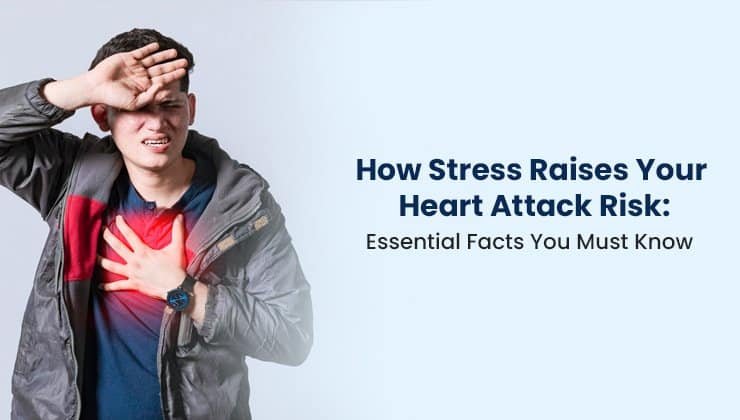In today’s fast-paced world, stress has become a part of daily life. One of the most concerning effects of chronic stress is its link to increasing the risk of heart attacks by raising blood pressure, disrupting cholesterol balance, and increasing inflammation.
Recognizing the warning signs early and taking steps to manage stress through healthy lifestyle choices, emotional support, and professional guidance may significantly reduce the risk of developing a heart attack.
Keep reading to know more about how stress raises the risk of a heart attack and different measures to manage stress effectively.
Understanding Stress And Heart Attack
Research has shown that both acute and chronic stress may significantly impact heart health. When you are stressed, your brain activates the body’s fight or flight response, releasing hormones such as adrenaline and cortisol. The high levels of these stress hormones may increase breathing rate, heart rate, and blood pressure.
Over time, prolonged stress may lead to a continuous surge of stress hormones which may lead to persistently elevated heart rate and blood pressure. This ongoing pressure may also promote the buildup of plaques, damage blood vessels and increase the risk of a heart attack.
How Stress Impacts the Heart?
Chronic stress may affect the structure and function of the cardiovascular system, causing heart disease in several direct and indirect ways. It has been shown to
- Increase inflammation: Chronic stress promotes inflammation in the body that may lead to the buildup of plaque inside the arteries, a process known as atherosclerosis. When the plaques rupture, they may block the blood flow to the heart, causing a heart attack.
- Raise the heart rate and blood pressure: Stress hormones constrict blood vessels, which may damage arteries and raise the risk of hypertension and heart attack.
- Abnormal heart rhythms: Stress may trigger irregular heartbeats, especially in people with existing heart conditions
- Unhealthy cholesterol levels: High cortisol may lower HDL and raise LDL and triglycerides, contributing to heart disease.
Signs Stress Is Affecting Your Heart
Stress is often seen as a mental issue, but it may also show up as physical symptoms. If you experience any of the following signs, your heart may be under stress:
- Frequent headaches or dizziness
- Heart palpitations
- Shortness of breath
- Rapid heartbeat
- Chest pain or tightness
- Feeling anxious, irritable, or overwhelmed
If you are experiencing these symptoms regularly, it is recommended to seek immediate medical advice to rule out any underlying heart condition.
How To Minimize Stress And Heart Attack Risk?
Stress can be reduced through healthy lifestyle choices, including nutrition, exercise, and relaxation techniques. Managing stress early may lower its impact on the body and help prevent the risk of a heart attack.
Some effective strategies to minimize stress and protect the heart include the following:
1. Exercise Regularly
Regular exercise may help reduce the harmful effects of stress by controlling weight, improving cholesterol levels, and lowering blood pressure. It also releases endorphins that help relax and manage stress more effectively.
It is recommended to aim for at least 150 minutes of moderate-intensity exercise, including brisk walking, cycling, or swimming, per week for heart health. Even short bursts of physical movement, including stretching or taking the stairs, may positively affect your overall heart health.
2. Eat a Balanced Diet
A heart-healthy diet may reduce the impact of stress on the body and support overall cardiovascular wellness. Incorporate fruits, vegetables, whole grains, lean proteins, and healthy fats in your diet to promote a better mood.
Limit caffeine, processed foods, and sugar snacks as they may increase anxiety, disrupt sleep, and raise blood pressure. Choosing wholesome, balanced meals may keep the body nourished and the heart stronger under stress.
3. Get Adequate Sleep
Poor sleep may raise stress hormone levels like cortisol making it hard for the body to manage stress. Over time, it may contribute to inflammation, weight gain, and a higher risk of heart disease.
It is recommended for adults to aim for at least 7-8 hours of quality sleep every night. You may establish a calming bedtime routine, including reading and turning off screens, to help the mind relax.
4. Get treatment for Constant Depression or Anxiety
Emotional stress caused by depression, anxiety, and other related mental conditions may also increase the risk of heart disease.
It is recommended to try stress-relieving activities, including yoga, walking, meditation, or other methods, to manage anxiety levels.
However, if these feelings persist, you may also talk to a mental health professional to reduce emotional strain and lower the risk of heart disease.
5. Build a Strong Support System
Research has shown that having a strong support network may reduce stress levels and lower the risk of heart disease. Talking to a friend, volunteering, or joining a hobby group may provide emotional comfort and help your body manage stress more effectively.
In contrast, lack of a social support system may increase the chance of engaging in unhealthy behaviours, including smoking, eating a high-fat diet, and drinking alcohol.
So, building and maintaining relationships help protect heart health.
6. Practice Relaxation Techniques
Simple relaxation techniques may have a big impact on stress levels and protect heart health. Try deep breathing, meditation, or yoga to calm the mind and body by lowering heart rate and blood pressure.
You may practice journaling to calm the mind, lower heart rate, and reduce the risk of developing a heart attack.
When to Discuss Stress with a Healthcare Provider?
It is important to speak with your healthcare provider if stress feels constant or begins to affect your physical health. Seek medical attention if you experience
- Chest pain or pressure
- Shortness of breath
- Irregular heartbeat
- Persistent fatigue or insomnia
Your healthcare provider may recommend heart screening, blood pressure checks, or counselling for stress management. Early medical intervention may prevent stress and more serious heart-related problems and improve the quality of life.
Conclusion
Chronic stress over time has been shown to raise blood pressure, disrupt cholesterol balance, and increase inflammation, which in turn elevates the risk of heart disease and heart attack. It is recommended to recognize the signs of ongoing stress and take steps to manage through lifestyle changes, emotional support, and professional guidance when needed.
If you are experiencing chronic stress that is affecting your heart, contact Heart360 Care. Our team of cardiologists and wellness experts may help manage stress effectively and protect heart health through personalized guidance and comprehensive care.
Frequently Asked Questions
Yes, managing stress effectively may help reduce blood pressure, lower inflammation, and improve cholesterol levels, which may help in preventing heart disease and heart attacks. It is recommended to incorporate relaxation techniques, regular exercise, and emotional support to significantly decrease the risk of heart attacks and promote long-term cardiovascular health.
Yes, chronic stress may increase the risk of a heart attack. Anxiety may trigger the release of stress hormones, including adrenaline and cortisol, which over time, may damage the blood vessels, disrupt heart rhythms, and contribute to heart disease or cardiac events.
You may prevent a stress-related heart attack by managing stress effectively through healthy lifestyle habits. It is recommended to engage in regular exercise, eat a balanced diet, and get adequate sleep. You may practice relaxation techniques, including meditation, yoga, or deep breathing, to help with persistent anxiety or depression.
You may talk to your healthcare provider if you feel stressed but have no heart symptoms. Chronic stress may silently affect the heart over time by raising blood pressure and inflammation. A healthcare provider may help assess the risk, suggest coping strategies, and prevent future heart-related complications.









